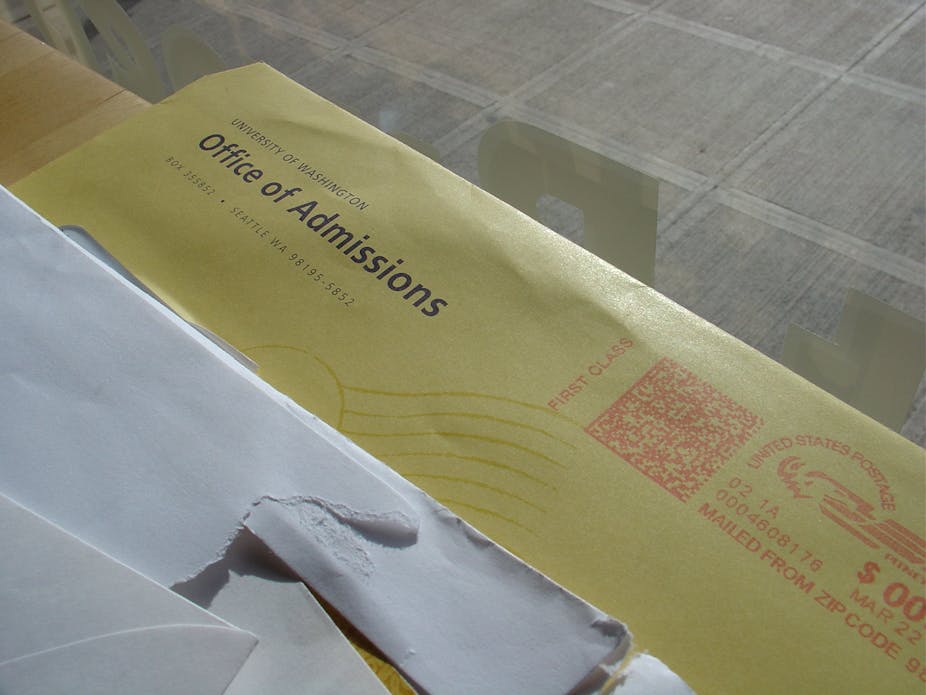As A-level results day approaches, students and universities alike are gearing up for the most frantic period in the academic year - the short window during which results are issued and offers of places confirmed. Others will find themselves thrown into the frenzy of clearing if they miss out on an offer made to them based on predicted grades, a system that is unique to the UK.
While students and their families are no doubt anxiously awaiting Thursday’s results, it’s worth taking a moment to look at how other countries approach the tricky transition from school to university. University admission systems around the world are very different but we can still learn from our neighbours.
In a special issue of Comparative Education Review, my co-editor Daniel Sabbagh and I selected papers reflecting on university admissions in different countries. We we interested in what different countries saw as being “fair” when it comes to admission and see how university admission relates to other characteristics such as social class and ethnicity. The results were illuminating.
The UK: where UCAS forms deepen divides
The UK system is unique in many ways, with pre-qualification admission and nationally standardised school leaving exams. We think of our entry system as being fairly meritocratic. We might tweak entrance requirements to level the playing field, but ultimately, everyone has to make their case for precious places on their preferred course.
But, [research](http://www.jstor.org/discover/10.1086/670666?uid=3738032&uid=2134&uid=2&uid=70&uid=4&sid=21102548581543](http://www.jstor.org/discover/10.1086/670666?uid=3738032&uid=2134&uid=2&uid=70&uid=4&sid=21102548581543) coming out of the University of Manchester shows that the language used in personal statements on UCAS forms, as well as the experiences students describe in them, varies dramatically between private and state school pupils.
This raises the question of whether using personal statements is really a fair way to decide who should be admitted to your university. While the statements are meant to give more opportunities to describe the motivation of applicants, we are potentially limiting opportunities for poorer students through this system.
Lotteries: fairer than you think
The thought of leaving major decisions about your future up to fate will sound unappealing to many in the UK. Students and parents spend precious time visiting potential universities and weighing up the benefits of each. But lotteries for allocating university places might not be such a bad idea.
[Research](http://www.jstor.org/discover/10.1086/670663?uid=3738032&uid=2134&uid=2&uid=70&uid=4&sid=21102548581543](http://www.jstor.org/discover/10.1086/670663?uid=3738032&uid=2134&uid=2&uid=70&uid=4&sid=21102548581543 ) debating whether a lottery system should be introduced for universities in Ireland shows that lotteries eliminate all reasoning, the good as well as the bad. In a lottery, the subtlety of whether achieving an A* in Chemistry is better than getting an top mark in media studies might be lost. Recognising such a difference, some might argue, is good reasoning.
But in a lottery, you also eliminate bad reasoning such as taking one student over another because they are male, not male, white, not white, from this school or from that school. Lotteries also force those selected for some of the most sought after courses to acknowledge that there was an element of luck involved in getting them to where they are. Maybe the humility this instils wouldn’t be such a bad thing.
Egypt: proof that state support open doors
Does the state have a role to play in making university access fairer? [Work](http://www.jstor.org/discover/10.1086/670665?uid=3738032&uid=2134&uid=2&uid=70&uid=4&sid=21102548581543](http://www.jstor.org/discover/10.1086/670665?uid=3738032&uid=2134&uid=2&uid=70&uid=4&sid=21102548581543) coming out of Egypt suggests that an expansion of state funded education can serve previously under-served communities, such as rural students and women.
Privatising higher education, by contrast, is better for urban male students. Might the private market then not hold the answer to educational inequality, as some providers in the UK would have you believe?
Poland: adapt to changing demand
Indeed, whereas Egyptian higher education has been expanding, over in [Poland](http://www.jstor.org/discover/10.1086/670662?uid=3738032&uid=2134&uid=2&uid=70&uid=4&sid=21102548581543](http://www.jstor.org/discover/10.1086/670662?uid=3738032&uid=2134&uid=2&uid=70&uid=4&sid=21102548581543), the university system is contracting due to lower birth rates.
Free-market supporters will be disappointed to hear that state education comes out tops for equality in both countries, despite their different circumstances. Contraction creates a demand-driven system, where the first casualties might be private providers. This offers the opportunity for students to participate in affordable higher education regardless of the accident of their parental wealth and other potential barriers to entry.
Georgia: fairness for rural children
Here in the UK, we think about providing better opportunities for poorer students, state-educated students and ethnic minorities when we worry about the student demographic. But in [Georgia](http://www.jstor.org/discover/10.1086/670739?uid=3738032&uid=2134&uid=2&uid=70&uid=4&sid=21102548581543](http://www.jstor.org/discover/10.1086/670739?uid=3738032&uid=2134&uid=2&uid=70&uid=4&sid=21102548581543) - and, incidentally, in China - the underrepresentation of pupils from rural backgrounds is the big issue.
Urban children have access to better education opportunities and are more likely to go on to study for a degree at a desirable university. Perhaps there is a lesson here for us in the UK, where we might pay more attention to how we support the secondary and higher education of our rural children.
Practical solutions
The world often looks on developments in UK higher education with great interest. Our institutions are considered to be world leaders in so many respects but that doesn’t mean we have nothing to gain from a bit of reflection. It may help us create better opportunities for the underrepresented groups we have already identified and those we are yet to acknowledge.

